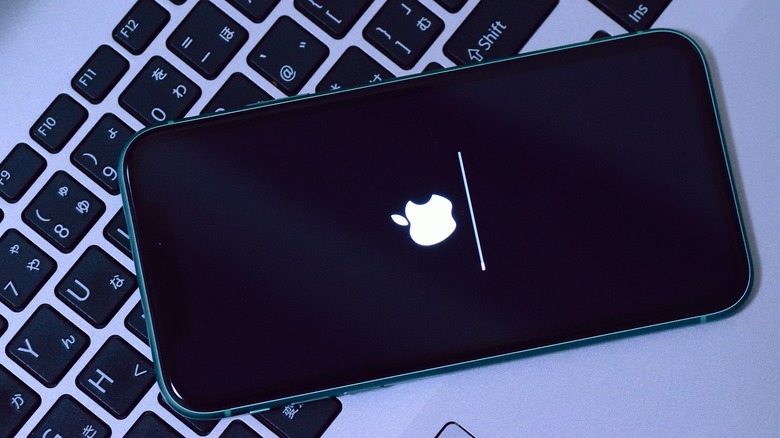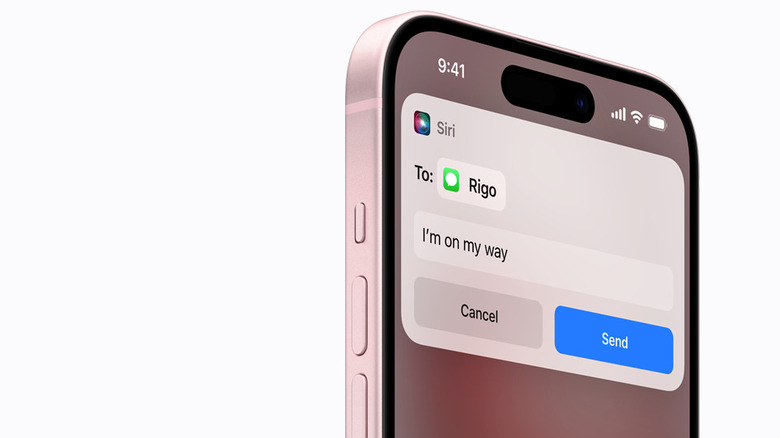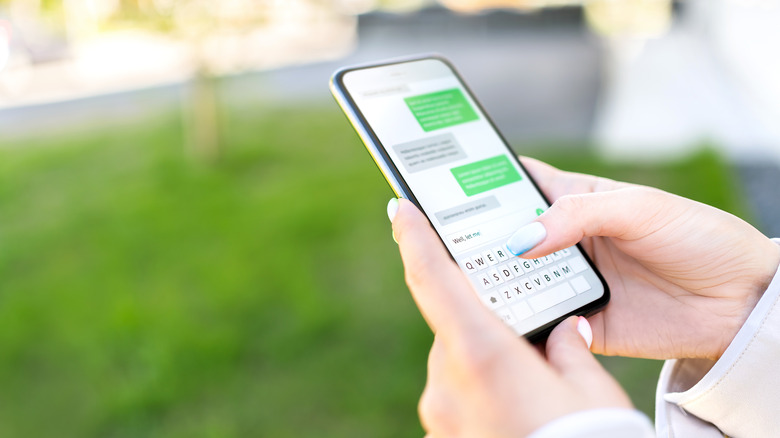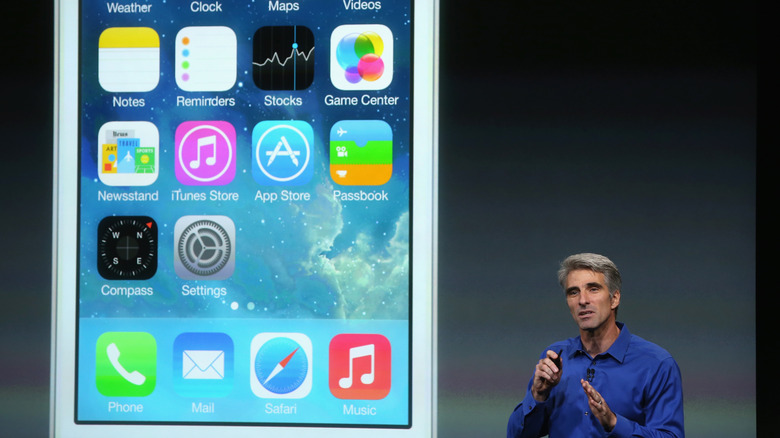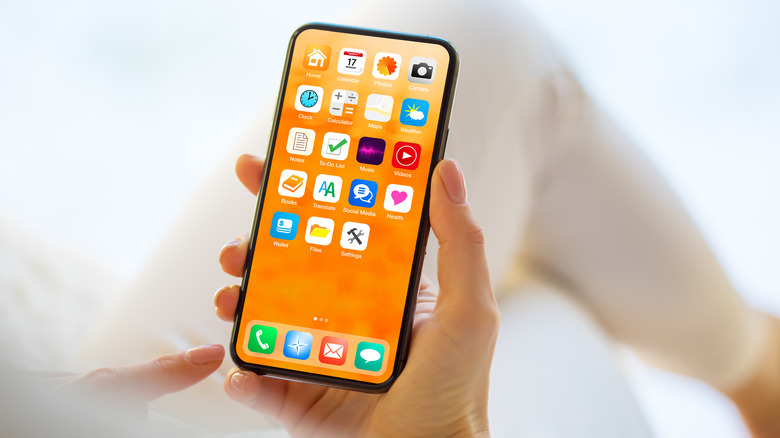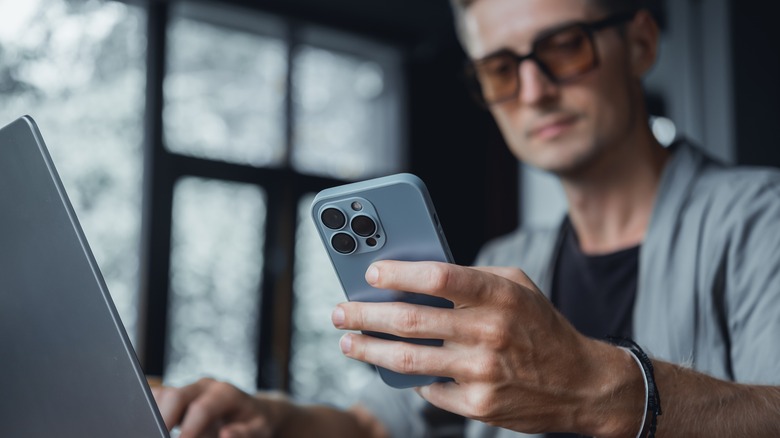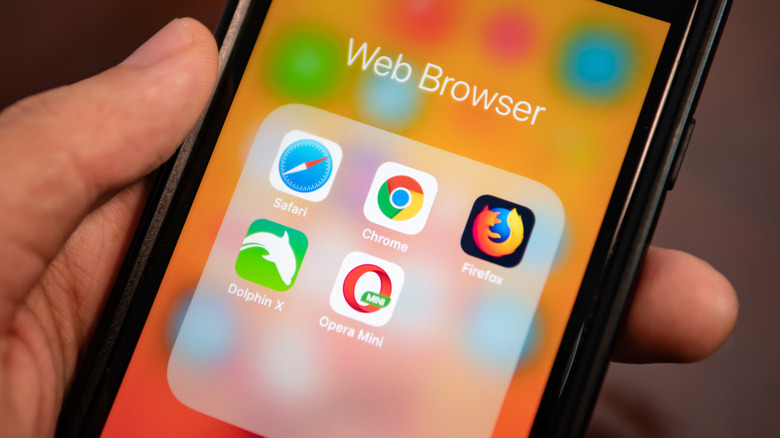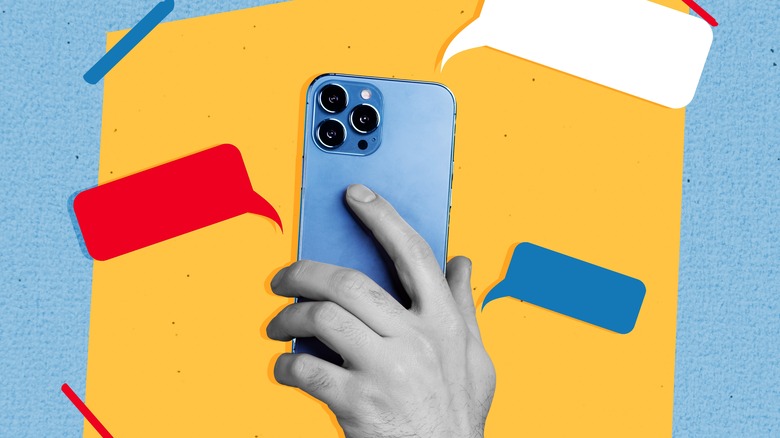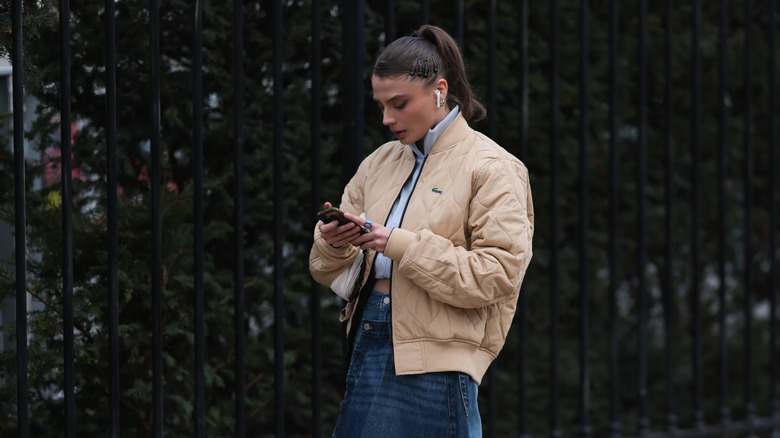10 Most Wanted iOS 18 Features We Hope To See In The Next Update
If there's one thing Apple's fanboys and detractors can agree upon, it's that the Cupertino tech giant is legendarily enigmatic for the world's first $3 trillion company. Apple is tight-lipped when approached for comment by journalists, so we're left to stew in rumors and leaks until it breaks its silence at the annual WWDC showcase and September iPhone reveal events , with the occasional random press release if we're lucky.
This made it quite surprising when Apple engineers beat everyone to the punch in 2024 by announcing, months ahead of schedule, that the upcoming iOS 18 software update would be the "biggest-ever revamp" in the company's history. Great news for those stuck in Apple's walled garden, since iOS has arguably fallen far behind the competition, whether it's Google Pixel's many intelligent features, or Samsung's features that make you rethink AI.
Of course, it's not just the gimmicky AI features iPhone users have been missing out on. For some time, we've been begging for the ability to schedule texts, to have split-screen multitasking, and even get the little stuff like a number row above the keyboard — among other things. If iOS 18 really is the "biggest-ever revamp," then it's probably safe to assume we'll get a healthy mix of groundbreaking new features and little quality-of-life refinements that we've been clamoring for along with it.
Here's SlashGear's list of the things we want from iOS 18, whether we're likely to get them or not.
Improved Siri
Siri was one of Steve Jobs' final additions before he died in 2011; the concept started off as a digital assistant project in 2010 until Steve Jobs acquired it for the iPhone 4S . Back then, Siri was revolutionary and pre-dated Amazon's Alexa and Google Assistant by several years. Siri is not perfect, however. YouTuber Marques Brownlee's voice assistant battle revealed that Siri does fine with simple questions, but goes downhill from there. Siri couldn't, for example, set multiple timers, often took too long or failed to answer questions, and struggled to keep track of the current conversation's context — and that's just scratching the surface. Though the virtual assistant earned second place, she was miles behind Google Assistant in virtually every metric.
Wishes for a better Siri are likely to bear fruit. Rumors suggest iOS 18 will make Siri the "ultimate virtual assistant." Come September, users will hopefully have a Siri that can answer complex questions, remember past conversations across Apple devices, automate any task on the fly, and personalize itself to the user. Given the progress made by LLMs in recent years, it's hard to imagine a future where Siri doesn't make a noteworthy improvement. There's only one potential downside here; Apple appears to be considering Google's Gemini LLM, which raises privacy concerns if the new-and-improved Siri — praised for local, on-device privacy — starts sharing data with Google.
Intelligent call features
Google Pixel owners are already living in the future thanks to features like an automatic Call Screen. Once set up, you've effectively got a digital secretary who takes unknown calls for you, finds out who they are and what they want, and then lets you decide whether to answer or not with a real-time transcription of their words. Having used this feature, it works exceptionally well. Sales and spam calls quickly become a thing of the past. It's also much-needed protection against the rise of AI scam calls that clone your voice for nefarious purposes. The only competing options Apple offers are to silence all unknown callers or to use a third-party call screening app.
We'd love Apple call screening that uses Siri as your "digital secretary" and provides a silent transcription of any call in progress. This would also be a huge plus if you can't pick up the phone or don't want to. Perhaps Siri could keep a transcript or summary of the call for later (as Google does) and a warning if it's a suspected scam call. Apple could go a step further and add other thoughtful features such as something like Google's Hold for Me (which "waits in line" for you on a customer service call queue) or Direct My Call (which lets you navigate an automated phone menu on your screen without listening to the call).
Knowing Apple, they may come up with their own industry-defining features.
Full RCS support
One of Apple's biggest holdouts has been its refusal to play nicely with Android phones via iMessage, forcing iPhone-Android conversations to happen in SMS/MMS. SMS/MMS have virtually been put out to pasture on modern smartphones due to their poor media support, shorter character limits, lack of read receipts and typing indicators, and, most importantly, a complete dearth of encryption.
End-to-end RCS encryption means no one can read your texts, compared to SMS/MMS which get sent over telephony networks completely exposed for any bad actor to read. Apple has argued for years that its blue bubbles keep iPhones "secure," to which Samsung and Google have replied by throwing shade at iPhone's green bubbles. Regardless of where you stand, SMS/MMS is an objectively worse, less secure experience for all.
Apple probably won't ever nix the blue and green bubbles, but it's confirmed that it will support cross-platform RCS by the end of 2024. We may see this long-awaited feature with the release of iOS 18, or shortly after. All the things iPhone-Android convos have been missing — including better group chats and location sharing — should work regardless of bubble color. Of course, Apple's stubborn. iMessage-to-iMessage, in their eyes, continues to be the most secure, privacy-friendly way to communicate. Still, we'll gladly take an unsightly green over Tim Cook's expensive solution to simply "buy your Mom an iPhone."
iOS design refresh
In a world where every app and its dog gets a complete UI overhaul every six months, it may surprise some that iOS's current iteration is, to an extent, just a polished version of the iOS 7 that was released way back in 2013. At a glance, you may not be able to tell iOS 7 apart from the current iOS 17. To some (such as this writer), iOS 17 looks great, and if it ain't broke, don't fix it. However, that sentiment isn't widely shared in the iPhone community. u/tw1stedpair in a Reddit thread on r/ios says, "A visual refresh would be nice. The current iPhone look is getting old."
The 43 upvotes that put u/tw1stedpair's comment at the top of the thread would seem to agree, and as luck would have it, so does Apple.
A rumor originating with The Verifier suggests Apple's new visionOS (the bedrock for the Vision Pro's aimless, yet great tech) may provide the template for an iOS refresh. Perhaps a more grayish-looking aesthetic with transparent windows to bring Apple's entire ecosystem into closer alignment. Granted, this — like everything so far on this list — is just a rumor.
Many have high hopes there will be a design refresh; Apple is grappling with a declining market share and the nascent US antitrust lawsuit, so spit-shining the UI is an easy way to please their customer base.
Better home screen organization
The online "discourse" between Android and iPhone users is always predictable. An iPhone user praises an iOS feature they like, to which an Android user points out that said feature has already been on Android for years prior. This, more often than not, tends to be true. One thing Android has had as long as we can remember is the ability to place home screen app icons wherever one likes, compared to iOS forcing apps to remain locked in sequential grid order. Annoying, since it throws all your apps into disarray when you dare to move just one of them. In iOS, people want to be able to put apps wherever they want — and they may get just that.
Mark Gurman — the king among Apple leakers – suggested iOS 18's home screen may offer greater customization. It's a small thing, but as the saying goes, it's better late than never. It would also be preferable to see the option to control home screen grid sizes so users can fit more — or less — apps in the same space. Plus, it would be nice to have the same control with home screen widgets, perhaps with the option to resize them at will rather than deleting and replacing them. As a bonus, Apple should expand upon its limited Live Wallpapers feature so people can have videos — and perhaps interactive wallpapers — playing in the background.
A better back button
One thing Android users switching to iPhones notice immediately is the lack of a back button. This was an intentional design choice rather than a missing feature, according to Apple Explained on YouTube. The story goes that circa 2007 (before the first iPhone's launch) Imran Chaudhri — now the founder of Humane's wearable AI companion pin — convinced Steve Jobs that a dedicated back button without a single function (i.e. just going back one page) would create a "trust issue." He argued a multi-functional back button would become "unreliable and complicated." In theory, the iPhone has a near-universal "back button" already, as swiping right from the left edge of the screen usually takes you back to the previous page.
It's neither a perfect nor an enjoyable solution for most, and we're convinced Apple could do better by taking a page out of Android's book.
Android has been on the same gesture navigation train as iOS for years. That is, swiping up from the bottom bar to access the home screen, swiping up and holding to see recent apps, and swiping along the bar to switch apps. However, Android has the upper hand with its back gesture, activated by pulling inward from either edge of the screen and letting go. It's a game-changer that makes one-handed phone use easier, and becomes painful to live without once you switch to iPhone. It would be joyous if iOS 18 included a similar, Apple-ified back gesture.
Better third-party browser support
Third-party browsers on iPhone pale in comparison to Safari, but that's not necessarily because Safari is inherently better. Rather, every non-Safari browser on iOS is forced by Apple to use the WebKit engine rather than their native Chromium, Blink, or Gecko. In effect, Chrome, Firefox, Opera, and others on iOS end up being a flimsy skin around WebKit, which neuters them of everything that makes them worth using on other platforms. Apple claims the restriction is for security reasons, as usual, but it's actually to maintain its monopoly. Thanks to Europe's Digital Markets Act, Apple was forced to open up and allow browser developers to use their engines of choice in update 17.4. For the first time, iOS can experience third-party browsers as they were meant to be — if they live in Europe, that is.
Regardless, this gives us hope that Apple may soon concede that freedom to the entire user base. The aforementioned DOJ case against Apple likely won't be the last, and we suspect the US government (and others) will further take Apple to task for its many monopolistic practices. As the heat increases, Apple may beat regulators to the punch by easing their grip on wanted features to avoid further penalties and legal battles.
AI-enabled photo editing
Circling back to the Google Pixel, another groundbreaking feature it introduced is the Magic Eraser. It can automatically remove unwanted background elements with AI so it looks like they were never there in the first place. The Pixel also lets you transform already-taken photos into Bokeh-blurred portraits , unblur out-of-focus shots, and even combine the best group photo smiles into a single image. Samsung's S24 went a step further, letting you erase shadows and reflections, and even move or remove subjects entirely. Needless to say, iOS doesn't even come close with its default Photos app.
For iOS 18, we'd like to see AI-enabled photo editing. Apple's approach will likely be much more comprehensive and hands-off, letting you apply automatic suggestions while retaining older versions so you can revert your edits in the future. Apple's also big on offline, on-device processing for reasons of privacy, so we imagine they'll continue that tradition so you're not sending your pics off to some questionable server for processing. Who knows, maybe Apple will come out ahead of the competition by making it so the camera automatically takes pictures the way you like as you're snapping a shot so an edit becomes unnecessary; say, for example, automatically removing a tourist lurking in the background of your photo in front of the Eiffel Tower. We'd be happy with improvements of any kind in this area.
Improved notifications
Notifications are another area where iPhone gets pretty universal disdain. It's hard to choose just one thing we hate about iOS notifications. Take, for example, how you can't swipe them away when they pop down from the top of the screen (you have to open the notification drawer to do so), or how you can't fine-tune notification channels (Unlike Android, you can't choose which types of notifications an app sends you from iOS Settings). This is another area where Android blows Apple out of the water.
On iOS 18, we'd love it if Apple would swallow its pride and copy Android's notification system to some degree. Aside from fixing the above, Apple could allow us to see our notification history, snooze notifications that we want to see later or allow people to alter those notification channel settings directly from a specific notification in the drawer without going to Settings. The list goes on. Like with the Photos app, any improvement in this area would be welcome.
Better volume control
Another weak point in iOS is the lackluster volume control. Long story short, you can't change the individual volume settings for your ringtone, alerts, and media volume from the software volume slider. Instead, you have to either change a specific setting when it's playing or jump into the settings. Further, apps don't remember unique volume settings, so you're constantly adjusting the master volume as you go from app to app. Volume control on iOS is a pain, especially knowing that on Android you can access all volume mixer settings directly from the volume slider.
We'd love for Apple to make these volume adjustments not just easier when it comes to mixer settings, but as a holistic experience. We hope Apple's big AI push means we get more adaptive, personalized volume control across the board. Imagine how convenient it would be if Siri learned from your volume habits. For example, how you turn down the movie volume while watching at night, or crank the podcast volume while hitting the gym. Perhaps with iOS 18, consumers can soon forget about making volume changes since the AI personalization will fine-tune it across locations, apps, and listening devices.
Improved keyboard and predictive text
While this writer finds the iPhone's keyboard acceptable, many do not. Critics pan the stock keyboard for being too sluggish, featuring next-to-useless auto-suggestions, and struggling to correct even the most basic misspellings. While you can switch to a third-party keyboard like Gboard, Apple does as much as it can to inconvenience you until you regret that decision. Credit where credit is due, Apple has been making slow strides toward improving its stock keyboard, such as when they introduced in-line suggestions in iOS 17. Most, of course, believe it's still got a ways to go.
Artificial intelligence could again make all the difference here. Many hope that iOS 18 uses its fancy new AI integration to better learn from our typing habits. Perhaps we'll get predictions that let us type out entire sentences. AI corrections will hopefully make fixing text a breeze, or be so good while we're typing that we don't have to make them in the first place. Apple's dictation is already commendable, but Google still takes the crown, continuing to beat the iPhone even when multiple languages are involved. More accurate voice recognition here will help just as much as it does in other areas.
Better transcriptions
Speaking of voice dictation, there is one final area where iOS could potentially wow us — and again, we're going to look to Google for inspiration here. Among the many ways recent Pixel phones changed the game was with their jaw-droppingly good voice transcription. Not only is it accurate and fast, but it remembers your preferred spelling for specific words and pulls names from your contact list to get them right. Saying "send" at the end of the message won't transcribe it, either; the Pixel automatically interprets it as a command. Most impressive of all is that Google's voice transcription can tell apart different speakers and label them separately, making it indispensable for recording meetings or interviews. iPhone can't yet do any of this.
iOS's Voice Memos app is already great for voice notes, but it has no smart features to speak of. We think including smart transcriptions like the above wouldn't be a hard ask, and Apple could likely add additional thoughtful touches where Google falls short. We'd also like to see accessibility options similar to those on the Pixel, such as the Live Transcribe feature that lets those who are hard of hearing get subtitles on real-life conversations as they're happening. iPhone is already in a class of its own when it comes to accessibility features, so it's small, intuitive inclusions like this that make all the difference.
